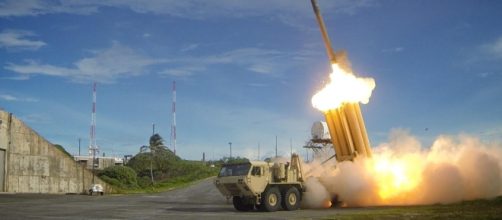The Pentagon confirmed that the US State Department has approved the sale of THAAD missile defense systems to Saudi Arabia. With a technologically superior detection and radar system, THAAD is one of the most advanced anti-missile technologies available today. Such defense systems have been sold to Qatar and UAE in the past. Al Jazeera reports that the deal that will go down with the Saudi's will include the purchase of 44 Terminal High Altitude Area Defense (THAAD) launchers and 360 missiles from the US Army.The Saudi's will pay a total of $15 billion for the defense system setup.
President Trump discussed strategic cooperation during his visit in May
This sale comes in the wake of many discussions between the Saudi Premier Salma Bin Abdulaziz al-Saud and President Trump during Trump's visit to Saudi Arabia in May of this year. The final hurdle is to get full Congressional approval. If Congress doesn’t object within 30 days, the sale would go ahead without any glitches.
The $15 billion dollar sale, according to a report from the Guardian is touted to improve the long-term safety of the middle-eastern nation. THAAD has been previously deployed in South Korea in lieu of increasing aggression from North Korea. This promptly drew criticism from China who warned that such measures could cause instability in the region.
What prompted the sale now?
The reasons cited for the sale are current security concerns with Iran. Of late Iran’s aggressive tactics, like unprecedented missile tests, have been disturbing the fragile peace in middle-east. Sanctions seem futile against the country’s resolve. The sale has faced some sharp criticism for another reason. Saudi Arabia has long been at war with Yemen. Human rights organizations have severely criticized the ongoing war effort.
According to a report from Reuters, the UN Human rights chief pins the blame for civilian casualties in Yemen on Riyadh’s relentless bombing of the region. Early 2015 saw rebel forces capture much of northern Yemen. Saudi led forces have been bombing the area to rid the place of rebel Houthi forces ever since.
This has turned into a major human rights crisis leaving millions of Yemenis without access to food, potable water or jobs.
Reports from PRI claim that Iran has been funding Houthi rebels and thus aiding a proxy war with Saudi Arabia. Such actions have set Saudi Arabia on edge. It’s needless to say that THAAD battery systems would make rebel forces and Iran think twice before launching missiles at Saudi Arabia.
It should be noted that President Obama signed a nuclear deal with Iran allowing the nation to harness nuclear power for energy generation. The deal might get canceled now that Iran is defiant to all sanctions and terms that were agreed upon.


